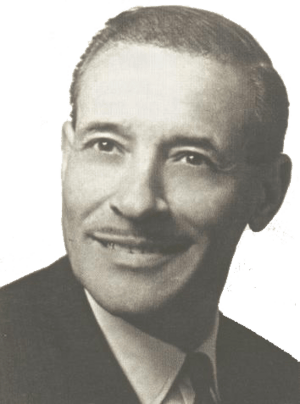Hédi Jouini facts for kids
Quick facts for kids
Hédi Jouini
|
|
|---|---|
| الهادي الجويني | |

Portrait of Jouini.
|
|
| Born |
Mohamed Hédi Ben Abdessalem Ben Ahmed Ben Hassine
1 November 1909 Tunis, French Tunisia
|
| Died | 30 November 1990 (aged 81) |
| Nationality | Tunisian |
| Occupation | Singer, oud player, composer |
Hédi Jouini (born November 1, 1909 – died November 30, 1990) was a very famous Tunisian singer, oud player, and composer. An oud is a stringed instrument, a bit like a lute or guitar. During his long career, Jouini created about 1,070 songs and 56 short musical plays called operettas. His songs were inspired by traditional music from Andalusia (a region in Spain). They became very popular in Tunisia and other countries in the Mashriq (the eastern part of the Arab world).
Contents
Hédi Jouini's Life Story
Early Years in Tunis
Hédi Jouini was born Mohamed Hédi Ben Abdessalem Ben Ahmed Ben Hassine. He was born in the Bab Jedid area of Tunis, the capital city of Tunisia. When he was young, he enjoyed singing religious songs for local events and ceremonies. He decided to leave school to focus on music and singing. He especially loved the songs of the famous Egyptian singer, Mohammed Abdel Wahab.
Starting His Music Career
Hédi Jouini briefly attended a music school called The Rachidia. From the age of sixteen, he started playing the mandolin in local music groups. He learned to play the oud from a person named Mouni Jebali. When he was 20 years old, his popularity grew a lot. This happened after he sang with the Arruqi music group in an area called Bab Souika. He also worked with Mahmoud Bayram al-Tunisi, who was a well-known writer and poet.
Later Life and Achievements
In 1938, Hédi Jouini performed a live concert for the opening of Radio Tunis. This was a big event for the new radio station.
In the 1940s, he appeared in a movie called Le Possédé. He also wrote songs for another film in 1948, named La Septième Porte. He even appeared in this movie with his wife, Widad.
In 1966, the president of Tunisia, Habib Bourguiba, gave him a special honor. He was made an officer of the Order of the Republic. This is a high award given for important contributions to the country. He received another award from President Bourguiba in 1982. This was to recognize his work and how much he helped enrich Tunisian culture.
In 1986, he created his very last song, which was called Masbarnech. A year later, in 1987, Jouini performed on stage for the last time in public. This final performance took place at the International Festival of Carthage.
His Influence on Music
Hédi Jouini had a big impact on Tunisian music. His songs are still loved and remembered today. A film about his life, called The Man behind the Microphone, was released in 2017. This movie helped more people learn about his amazing musical journey.
Images for kids
 | Emma Amos |
 | Edward Mitchell Bannister |
 | Larry D. Alexander |
 | Ernie Barnes |


